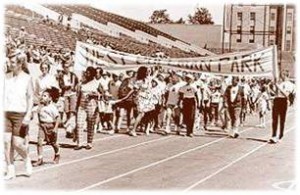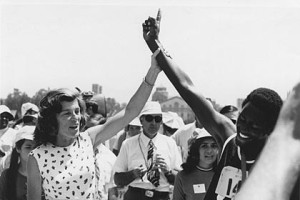History
Special Olympics is the first – and still the only – organization to offer training and competition for people with intellectual disabilities.
In 1970, 500 athletes gathered at a suburban Atlanta college to participate in the first-ever track and field event held under the Special Olympics Georgia banner. Over the past 50 years, the organization has grown exponentially and has helped thousands of children and adults in the process. The number of active athletes has grown to 18,546 participating in 29 sports. The first Executive Director of Special Olympics Georgia was Nancy Seekins from 1979-1982. Following her was Don Crawford from 1983-1996, and then Tex Crossin from 1996-1999. Current CEO Georgia Milton-Sheats is the longest-serving CEO of Special Olympics Georgia, having been in the position since 1999.
The national organization, Special Olympics Incorporated, was founded in 1968 by the late Mrs. Eunice Kennedy Shriver. Her son, Dr. Timothy Shriver, serves as Chairman of the Board of Directors.
Mission statement
The mission of Special Olympics Georgia is to provide year-round sports training and athletic competition in a variety of Olympic-type sports for all children and adults with intellectual disabilities, giving them continuing opportunities to develop physical fitness, demonstrate courage, experience joy, and participate in the sharing of gifts, skills and friendship with their families, other Special Olympics athletes and the community.
Our goal is to help bring persons with intellectual disabilities into the larger society under conditions whereby they are accepted, respected, and given the chance to become useful and productive citizens. When we achieve this goal through our sports program, we demonstrate that Special Olympics has a unique value: to show the world that every person counts and that every person can be something good when we work together.
Special Olympics Georgia invests in people with intellectual disabilities, helping them to develop athletic skills, while also promoting the abilities of the athletes off the field.
When our athletes succeed, attitudes change, communities develop, health and self-esteem is built, and the eyes of the world are focused on all that is good and hopeful and positive.
Athletes gain skills for employment, learn independent living skills, form relationships and help others understand their extraordinary capabilities despite health issues they experience daily.
Click here for the SOGA brochure.


